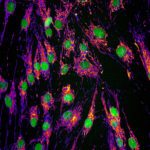Link to Pubmed [PMID] – 15523652
Hum. Mutat. 2004 Dec;24(6):509-16
Mutations in the MMAA gene on human chromosome 4q31.21 result in vitamin B12-responsive methylmalonic aciduria (cblA complementation group) due to deficiency in the synthesis of adenosylcobalamin. Genomic DNA from 37 cblA patients, diagnosed on the basis of cellular adenosylcobalamin synthesis, methylmalonyl-coenzyme A (CoA) mutase function, and complementation analysis, was analyzed for deleterious mutations in the MMAA gene by DNA sequencing of exons and flanking sequences. A total of 18 novel mutations were identified, bringing the total number of mutations identified in 37 cblA patients to 22. A total of 13 mutations result in premature stop codons; three are splice site defects; and six are missense mutations that occur at highly conserved residues. Eight of these mutations were common to two or more individuals. One mutation, c.433C>T (R145X), represents 43% of pathogenic alleles and a common haplotype was identified. Restriction endonuclease or heteroduplex diagnostic tests were designed to confirm mutations. None of the sequence changes identified in cblA patients were found in 100 alleles from unrelated control individuals.

